
There comes a time in the life of every amateur-but-enthusiastic photographer when they ask themselves the question:
Should I upgrade to a full-frame camera?
Full-frame cameras are the choice of professionals. They have larger sensors, more features, and are more powerful. They’re also more expensive. But will they help you take better pictures?
To help you decide, let’s look at the pros and cons of going full-frame…
What Is Full Frame?
A full-frame camera has a sensor that’s the same size as the old, industry standard 35mm film format. Its surface area is more than 2.5 times greater than the APS-C sensor commonly used in mirrorless and prosumer DSLRs.
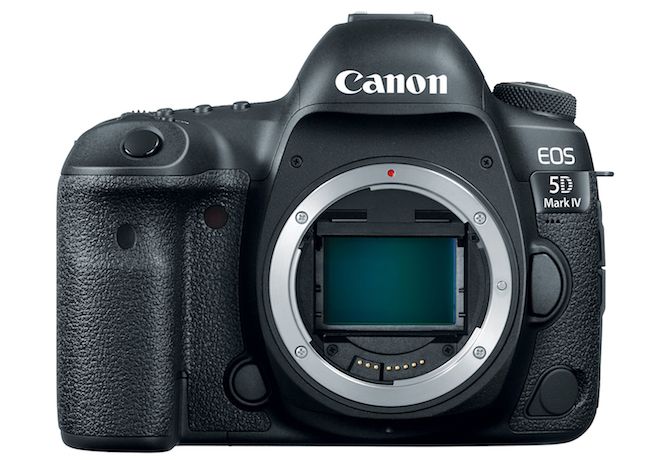
The larger sensor captures more light and can support a higher resolution without reducing the size of the pixels. It also comes in a larger, bulkier body.
Full-frame cameras don’t have a crop factor, so their lenses have a wider angle of view than their counterparts on smaller sensors, often referred to as crop sensors.
This helps produce soft, out of focus backgrounds, but might be less helpful if you shoot wildlife with long lenses. Check out our guide to the crop factor for a breakdown of what that means.
What Are the Benefits of Full Frame?
Full-frame brings many benefits, from an upgrade in image quality to the performance and features of its cameras.
Better Low Light Performance
The biggest attraction of full-frame is that it offers significantly better low light performance than a crop sensor.
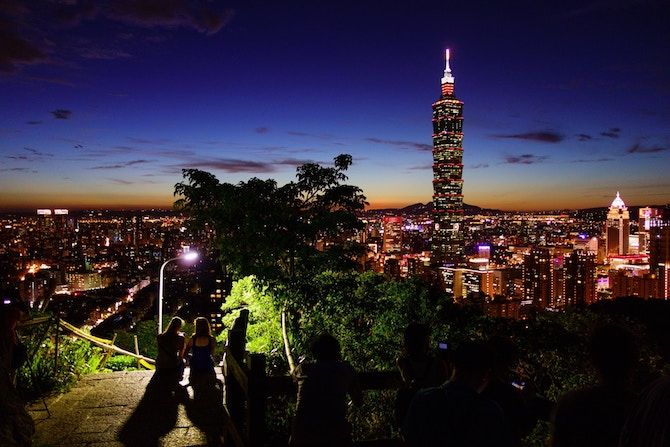
The larger sensor, which also contains larger pixels, captures more light and produces cleaner images. You can raise the ISO at least one or two stops higher than you can on a small sensor camera when image noise becomes a problem.
The difference is vast. DxOMark is a company that tests and ranks the technical performance of every major camera. They include a low light test, which measures noise levels at high ISO settings. As of June 2018, the first 43 places in their rankings were taken by full-frame cameras.
Even models several years old rank better than the best crop sensors.
Higher Dynamic Range
Dynamic range is another area where full-frame cameras shine. This is a measurement of how well a sensor can handle extremes of light and dark within an image.
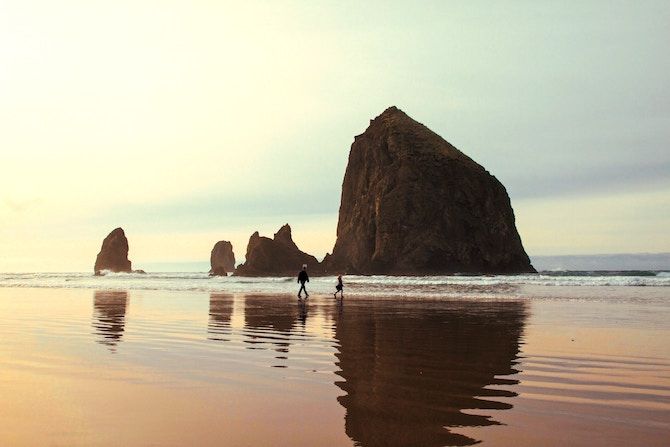
You’ll know the problem. On a camera with limited dynamic range you might expose your shot for the shadows and lose detail in the highlights (or the other way round). When a camera has wider dynamic range you can capture detail in both the shadow and highlight areas at the same time.
Again, the DxOMark tests show this. In their rankings for dynamic range, full-frame cameras fill 11 of the top 12 places.
The advantage is less exaggerated than with noise performance. This is because dynamic range tends to improve with every new generation of sensor. Therefore newer crop sensors may perform better in this area than full-frame models.
Shallow Depth of Field
One of the things that attracts people to images taken with full-frame cameras is the lovely bokeh effect they produce. You can get much softer, smoother backgrounds than you can achieve on crop sensor cameras.

It isn’t actually the sensor that creates the shallower depth of field. It’s more that the lenses shoot wider so you’re encouraged to get closer to your subject. The shorter the focussing distance, the shallower the depth of field becomes.
But the effect is clear. You can even test it yourself using an online depth of field simulator.
Better Lens Choice
A serious camera is only as good as the lenses you can mount on it. With a full-frame camera your options are unparalleled. You can choose anything from a 50mm (costing around $ 150) to a super telephoto zoom (costing thousands of dollars), like the kind you’d use if you were shooting the Olympic Games.
Once you decide what lenses you need, you won’t be short of choices.
Pro-Level Bodies
Because full-frame sensors are restricted to professional-level price points, they come in bodies with professional-level features. A full-frame camera doesn’t just get you a bigger sensor, it brings you an upgrade in almost every other aspect.
While you’re unlikely to get a single body that does everything, a full-frame camera will give you many of the following:
- Higher resolution
- Much faster auto-focus and focus tracking
- Greater responsiveness
- Larger and brighter viewfinder
- Durable and weatherproof body
- Longer battery life
- Dual memory card slots
- Faster or longer burst mode
Admittedly, high-end enthusiast DSLRs and premium mirrorless cameras are starting to close the gap in some of these areas. But on the whole, full-frame is where you go if you want the absolute best.
Why You Shouldn’t Buy a Full-Frame Camera
Full-frame cameras might be better, but that doesn’t mean they’re the right choice for you. Here’s why you should resist that upgrade.
They’re a Lot More Expensive
The strongest argument against full-frame cameras is that they’re expensive.
The cheapest full-frame camera will cost about the same, if not a little more, than the most high end APS-C mirrorless camera from FujiFilm or Sony. But these cheaper models tend to be several years old, and lack the recent improvements in things like dynamic range, speed, or image processing.
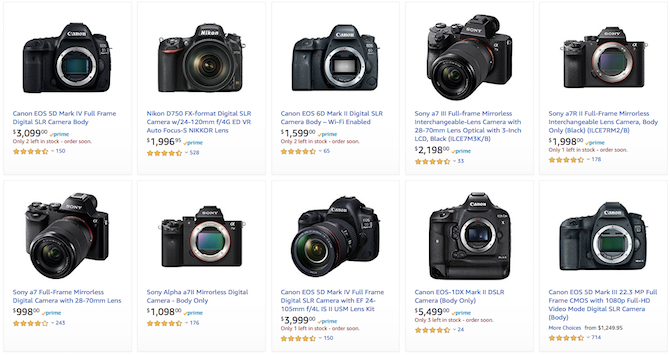
Meanwhile, premium mirrorless cameras are improving all the time. Old weaknesses like focussing speed, handling, or lens options no longer apply.
In other words, there’s a good chance the most affordable full-frame camera could well be worse than a similarly priced crop sensor alternative.
You Might Need Longer Lenses
We’ve looked at the lack of crop factor, and how this causes lenses to shoot wider on full-frame cameras. If you shoot with long lenses, and are on any kind of a budget, this is a major point to consider.
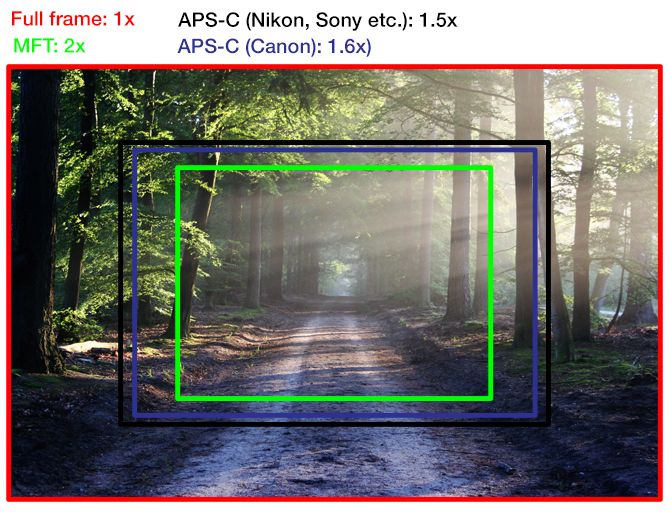
An affordable 300mm lens mounted on a Micro Four-Thirds camera will have the same angle of view as a 600mm lens on full-frame. A 600mm full-frame lens is very expensive.
Of course, the opposite also applies. If you shoot wide then you might find full-frame suits you better.
They’re Bigger, Bulkier, and More Complex
As far as marketing is concerned, full-frame cameras are for professionals and premium mirrorless cameras are for enthusiasts. There’s often not much difference in the abilities of the two groups of user, but there’s a huge difference between the two types of camera.
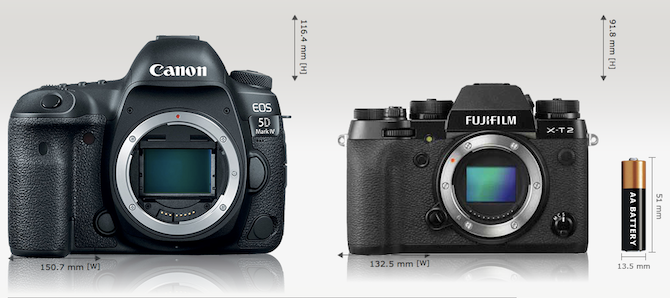
Almost without exception, full-frame cameras are larger, heavier, and more complex to master than their counterparts. If you’re on a paid shoot, this won’t matter. But if you’re roaming around Paris on vacation? You might want something a bit more convenient.
Or if you’re into street photography, that massive camera is going to draw attention and make people wonder why you’re taking pictures of them.
Full Frame Won’t Make You a Better Photographer
“If I had a better camera, I’d take better photos!”
You hear that repeated all the time. It’s understandable, since if you’re dissatisfied with your pictures it’s a lot more comforting to blame your gear than your technique.
But it isn’t true. A full-frame camera won’t magically transform your images. Brushing up on your photography skills, mastering composition or lighting, or even finding more interesting subjects to shoot, will.
Only when you’ve got that sorted should you even consider an upgrade. And that applies to new lenses, fancy filters, or anything else, too. Learn to use what you’ve got before you amass more stuff.
Should You Buy a Full-Frame Camera?
The answer is Yes… but only if you’re a gifted photographer and your current camera setup’s limitations are actually holding you back, or if you need amazing low light performance and professional-level features. And you don’t mind the added bulk.
For everyone else, the answer is… No. Not if you don’t need the benefits of a larger sensor. Not if you want something more portable for travelling, in which case amirrorless camera is the better option. Not if you’re on a budget—a new lens for your old camera might serve you better.
And definitely not if you think it will make you a better photographer. Instead, work on improving your photography skills with these exercises.
Read the full article: Should You Buy a Full-Frame Camera? 4 Things to Consider Before You Do
